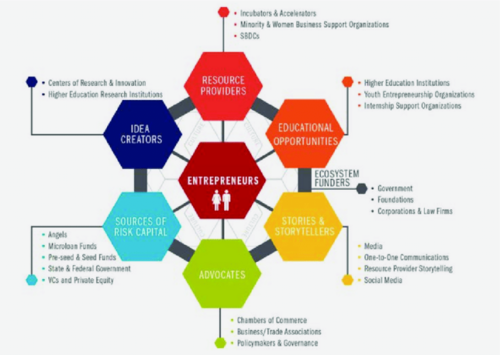
.png)
How do you define the entrepreneurial instinct? Can anyone be an entrepreneur?
The entrepreneurial instinct is the mental toughness that is required to make something from nothing. It is the mindset that allows you to take smart risks, thrive in ambiguity and bounce back from failure. It’s the reason why the team that looks good on paper doesn’t always win and why the drop out becomes a billionaire - we hear that story over and over again.
The idea that we are born knowing how to handle the greatest challenges of life is a theme that runs throughout eastern and western cultures in the major myths, religious texts and popular stories of our time. Some people just know how to tap into instinct. Others are put into situations where they are forced to draw from it. And for the rest of us, making the most of our innate talents and physiology comes from a process of discovery and practice. Instinct is universal; it doesn’t care where you come from. Anyone with a willingness be an entrepreneur and a persistence to keep at it when the road gets rough can do it

An entrepreneur is an individual who creates a new business, bearing most of the risks and enjoying most of the rewards. The process of setting up a business is known as entrepreneurship.
Entrepreneurs play a key role in any economy, using the skills and initiative necessary to anticipate needs and bring new ideas to market. Entrepreneurship that proves to be successful in taking on the risks of creating a startup is rewarded with profits and growth opportunities.

Entrepreneurship is one of the resources economists categorize as integral to production, the other three being land/natural resources, labor, and capital. An entrepreneur combines the first three of these to manufacture goods or provide services. They typically create a business plan, hire labor, acquire resources and financing, and provide leadership and management for the business.
Economists have never had a consistent definition of "entrepreneur" or "entrepreneurship" (the word "entrepreneur" comes from the French verb entreprendre, meaning "to undertake"). Though the concept of an entrepreneur existed and was known for centuries, the classical and neoclassical economists left entrepreneurs out of their formal models. They assumed that perfect information would be known to fully rational actors, leaving no room for risk-taking or discovery. It wasn't until the middle of the 20th century that economists seriously attempted to incorporate entrepreneurship into their models.

Not every entrepreneur is the same and not all have the same goals. Here are a few types of entrepreneurs:
Builders seek to create scalable businesses within a short time frame. Builders typically pass $5 million in revenue in the first two to four years and continue to build up until $100 million or beyond. These individuals seek to build out a strong infrastructure by hiring the best talent and seeking the best investors. Sometimes, they have temperamental personalities that are suited to the fast growth they desire but may make personal and business relationships difficult.2
Opportunistic entrepreneurs are optimistic individuals with the ability to pick out financial opportunities, get in at the right time, stay on board during the time of growth, and exit when a business hits its peak.
These types of entrepreneurs are concerned with profits and the wealth they will build, so they are attracted to ideas where they can create residual or renewal income. Because they are looking to find well-timed opportunities, opportunistic entrepreneurs can be impulsive.2
Innovators are those rare individuals that come up with a great idea or product that no one has thought of before. Think of Thomas Edison, Steve Jobs, and Mark Zuckerberg. These individuals worked on what they loved and found business opportunities through their vision and ideas.
Rather than focusing on money, innovators tend to care more about the impact that their products and services have on society. These individuals are not the best at running a business as they are idea-generating individuals, so they often leave the day-to-day operations to those more capable in that respect.2
These individuals are analytical and risk-averse. They have a strong skill set in a specific area obtained through education or apprenticeship. A specialist entrepreneur will build out their business through networking and referrals, sometimes resulting in slower growth than a builder entrepreneur.2

As there are different types of entrepreneurs, there are also different types of businesses they create. Below are the main different types of entrepreneurship.
Small business entrepreneurship refers to opening a business without turning it into a large conglomerate or opening many chains. A single-location restaurant, one grocery shop, or a retail shop to sell goods or services would all be examples of small business entrepreneurship.
These people usually invest their own money and succeed if their businesses turn a profit, which serves as their income. Sometimes, they don't have outside investors and will only take a loan if it helps continue the business.
These are companies that start with a unique idea that can be built to a large scale—think Silicon Valley. The hopes are to innovate with a unique product or service and continue growing the company, continuously scaling up over time. These types of companies often require investors and large amounts of capital to grow their idea and expand into multiple markets.
Large company entrepreneurship is a new business division created within an existing company. The existing company may be well placed to branch out into other sectors or it may be positioned well to become involved in new technology.
CEOs of these companies either foresee a new market for the company or individuals within the company generate ideas that they bring to senior management to start the process and development.
The goal of social entrepreneurship is to create a benefit to society and humankind. This form of business focuses on helping communities or the environment through their products and services. They are not driven by profits but rather by helping the world around them.

After retiring her professional dancing shoes, Judi Sheppard Missett became an entrepreneur by teaching a dance class in order to earn some extra cash. But she soon learned that women who came to her studio were less interested in learning precise steps than they were in losing weight and toning up. Sheppard Missett then trained instructors to teach her routines to the masses, and Jazzercise was born. Soon, a franchise deal followed and today, the company has more than 8,300 locations worldwide.3
Following an ice cream–making correspondence course, two entrepreneurs, Jerry Greenfield and Ben Cohen, paired $8,000 in savings with a $4,000 loan, leased a Burlington, Vt., gas station, and purchased equipment to create uniquely flavored ice cream for the local market.4 Today, Ben & Jerry’s hauls in millions in annual revenue.
In the 21st century, the example of Internet giants like Alphabet, the parent company to Google (GOOG), and Meta (META; formerly Facebook), both of which have made their founders wildly wealthy, have been clear examples of the lasting impact of entrepreneurs on society.
Unlike traditional professions, where there is often a defined path to follow, the road to entrepreneurship is mystifying to most. What works for one entrepreneur might not work for the next and vice versa. That said, there are seven general steps that many successful entrepreneurs have followed:
This first step is not a strict requirement but is definitely recommended. While entrepreneurs have built successful businesses while being less than financially flush, starting out with an adequate cash supply and stable ongoing funding is a great foundation.
This increases an entrepreneur's personal financial runway and gives them more time to work on building a successful business, rather than worrying about having to keep raising money or paying back short-term loans.
Once a person has strong finances, it is important to build a diverse set of skills and then apply those skills in the real world. The beauty of step two is it can be done concurrently with step one.
Building a skill set can be achieved through learning and trying new tasks in real-world settings. For example, if an aspiring entrepreneur has a background in finance, they can move into a sales role at their existing company to learn the soft skills necessary to be successful. Once a diverse skill set is built, it gives an entrepreneur a toolkit that they can rely on when they are faced with the inevitability of tough situations.
Much has been discussed about whether going to college is necessary to become a successful entrepreneur. Many well-known entrepreneurs are famous for having dropped out of college: Steve Jobs, Mark Zuckerberg, and Larry Ellison, to name a few.
Though going to college isn't necessary to build a successful business, it can teach young individuals a lot about the world in many other ways. And these famous college dropouts are the exception rather than the norm. College may not be for everyone and the choice is personal, but it is something to think about, especially with the high price tag of a college education in the U.S.
As important as developing a diverse skill set is, the need to consume a diverse array of information and knowledge-building materials is equally so. This content can be in the form of podcasts, books, articles, or lectures. The important thing is that the content, no matter the channel, should be varied in what it covers. Aspiring entrepreneurs should always familiarize themselves with the world around them so they can look at industries with a fresh perspective, giving them the ability to build a business around a specific sector.
Through the consumption of content across multiple channels, an aspiring entrepreneur is able to identify various problems in need of solutions. One business adage dictates that a company's product or service needs to solve a specific pain point, either for another business or for a consumer group. Through the identification of a problem, an aspiring entrepreneur is able to build a business around solving that problem.
It is important to combine steps three and four so it is possible to identify a problem to solve by looking at various industries as an outsider. This often provides an aspiring entrepreneur with the ability to see a problem others might not.
Successful startups solve a specific pain point for other companies or for the public. This is known as "adding value within the problem." Only through adding value to a specific problem or pain point does an entrepreneur become successful.
Say, for example, you identify that the process for making a dental appointment is complicated for patients, and dentists are losing customers as a result. The value could be to build an online appointment system that makes it easier to book appointments.

Most entrepreneurs can't do it alone. The business world is a cutthroat one and getting any help you can will likely help and reduce the time it takes to achieve a successful business. Networking is critical for any new entrepreneur. Meeting the right people who can introduce you to contacts in your industry, such as the right suppliers, financiers, and even mentors, can mean the difference between success and failure.
Attending conferences, emailing and calling people in the industry, speaking to your cousin's friend's brother who is in a similar business, will help you get out into the world and discover people who can guide you. Once you have your foot in the door with the right people, conducting a business becomes easier.
Every entrepreneur needs to be a leader within their company. Simply doing the day-to-day requirements will not lead to success. A leader needs to work hard, motivate, and inspire their employees to reach their best potential, which will lead to the success of the company.
Look at some of the greatest and most successful companies; all of them have had great leaders. Apple and Steve Jobs, Bill Gates and Microsoft, Bob Iger and Disney, are just a few examples. Study these people and read their books to see how to be a great leader and become the leader that your employees can follow by the example you set.

A small business and entrepreneurship have a lot in common but they are different. A small business is a company—usually, a sole-proprietorship or partnership—that is not a medium-sized or large-sized business, operates locally, and does not have access to a vast amount of resources or capital.
Entrepreneurship is when an individual who has an idea acts on that idea, usually to disrupt the current market with a new product or service. Entrepreneurship usually starts as a small business but the long-term vision is much greater, to seek high profits and capture market share with an innovative new idea.
Entrepreneurs seek to generate revenues that are greater than costs. Increasing revenues is the goal and that can be achieved through marketing, word-of-mouth, and networking. Keeping costs low is also critical as it results in higher profit margins. This can be achieved through efficient operations and eventually economies of scale.
Nurturing entrepreneurship can have a positive impact on an economy and society in several ways. For starters, entrepreneurs create new businesses. They invent goods and services, resulting in employment, and often create a ripple effect, resulting in more and more development. For example, after a few information technology companies began in India in the 1990s, businesses in associated industries, like call center operations and hardware providers, began to develop too, offering support services and products.
Entrepreneurs add to the gross national income. Existing businesses may remain confined to their markets and eventually hit an income ceiling. But new products or technologies create new markets and new wealth. Additionally, increased employment and higher earnings contribute to a nation’s tax base, enabling greater government spending on public projects.
Entrepreneurs create social change. They break tradition with unique inventions that reduce dependence on existing methods and systems, sometimes rendering them obsolete. Smartphones and their apps, for example, have revolutionized work and play across the globe.
Entrepreneurs invest in community projects and help charities and other non-profit organizations, supporting causes beyond their own. Bill Gates, for example, has used his considerable wealth for education and public health initiatives.

Research shows that high levels of self-employment can stall economic development: Entrepreneurship, if not properly regulated, can lead to unfair market practices and corruption, and too many entrepreneurs can create income inequalities in society. Overall, though, entrepreneurship is a critical driver of innovation and economic growth. Therefore, fostering entrepreneurship is an important part of the economic growth strategies of many local and national governments around the world.
Embarking on the entrepreneurial career path to “being your own boss” is exciting. But along with all your research, make sure to do your homework about yourself and your situation.

An entrepreneur is an individual who starts their own business based on an idea they have or a product they have created while assuming most of the risks and reaping most of the rewards of the business.
Entrepreneurship is the process of setting up a business, taking it from an idea to realization.
Four types of entrepreneurs include builders, opportunists, innovators, and specialists.
Seven primary characteristics among entrepreneurs include versatility, resilience, flexibility, money-savviness, business smarts, focus, and having strong communication skills.
An entrepreneur is an individual who takes an idea or product and creates a business, a process known as entrepreneurship. Creating a business requires a lot of work and dedication, which not everyone is cut out for. Entrepreneurs are often young, highly motivated risk-takers who have a vision and often sacrifice a lot to achieve that vision.
Entrepreneurs enter the market because they love what they do, believe their product will have a positive impact, and hope to make profits from their efforts. The steps entrepreneurs take fuel the economy; they create businesses that employ people and make products and services that consumers buy today.
More to read : 5 Ways The Internet Is Indispensable To Entrepreneurs
Becoming An Entrepreneur: Secrets To Success
Markethive is the Epicenter for the Entrepreneurs of the World
.png)
MarketHive is an entrepreneurial social marketing platform with the combined strength of LinkedIn, Amazon, Facebook and Marketo.
Markethive is at the forefront of marketing in today's online environment.
It's the perfect marketing platform for online marketers, businesses, affiliate marketers, brands, cryptocurrency enthusiasts, investors and anyone else that requires an online presence.
More info HERE <<<<
(4).jpg)
About: Andries vanTonder
Over 40 years selfemployed
He is a Serial Entrepreneur, an Enthusiastic supporter of Blockchain Technology and a Cryptocurrency Investor
Find me at my Markethive Profile Page | My Twitter Account | My Instagram Acount | and my Facebook Profile.
